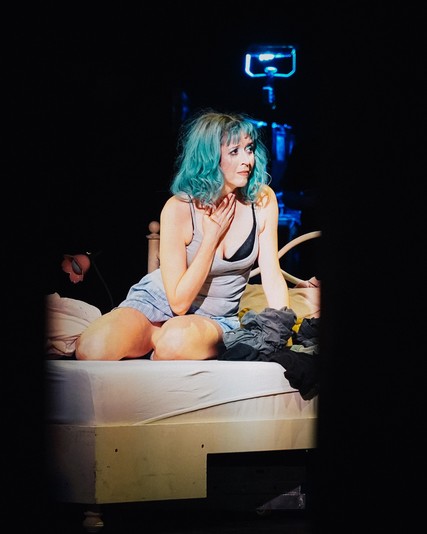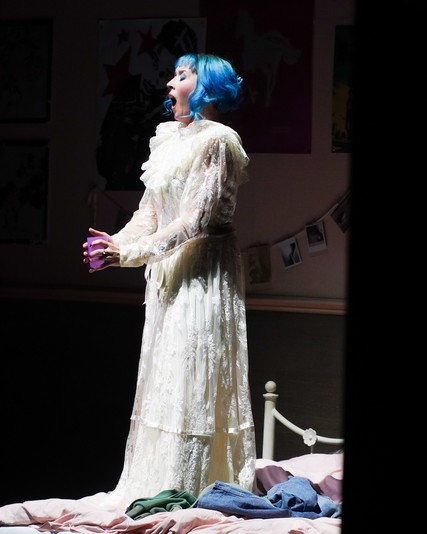Roméo et Juliette
Music by
Charles Gounod
Cast
| Juliette | Lisette Oropesa | |
| Romeo | Charles Castronovo | |
| Frère Laurent | Renato Girolami | |
| Mercutio | Jaka Mihelač | |
| Gertrude | Marina Prudenskaya | |
| Tybalt | Maciej Kwaśnikowski | |
| Benvolio | Andrés Moreno García | |
| Capulet | Arttu Kataja | |
| Paris | Irakli Pkhaladze | |
| Duke | Hanseong Yun | |
| Gregorio | Dionysios Avgerinos | |
| Stéphano | Rebecka Wallroth |
Francesco Ivan Ciampa
DirectorMariame Clément
Set DesignerJulia Hansen
LightingUlrik Gad
Fight DirectorRan Arthur Braun
Revival DirectorJosé Darío Innella
About
Lisette makes her debut at the Staatsoper Berlin in Roméo et Juliette.
The most famous lovers ever: virtually mythical figures, Romeo and Juliette from Shakespeare’s eponymous drama have dominated world literature ever since its premiere in 1597. Among the many musical settings of the work, Charles Gounod’s Roméo et Juliette is one of the most performed. It was a triumphant success already at its premiere as part of the 1867 Paris Exposition. Gounod focuses particularly on the emotional life of the two lovers, for whom he composes no fewer than four love duets. At the same time, he also explores the social context of their forbidden love in the form of powerful choral tableaux and a large fight scene between the enemy families. In this production, director Mariame Clément will place the focus on the youth of the title characters, presenting them not as an exaggerated ideal of a couple, but as young people of today who find their way to another despite all odds.

🍁 2025 - Fall Newsletter
🍁 2025 - Fall Newsletter
Reviews
Berlin: “Roméo et Juliette”, Charles Gounod
Lisette Oropesa war nun die Juliette und überraschte mit totaler Aneignung von Cléments Regiekonzept samt zweifelhafter Personenführung. Ihr Sopran besitzt eine individuelle Farbe und den gebührend leuchtenden, jugendlichen Klang für die Rolle. Die Koloraturen in „Je veux vivre“ perlen vollendet, die zweite, sogenannte „Gift“-Arie („Dieu! quel frisson“) singt sie mit Emphase und dramatischem Impetus.Lisette Oropesa was now Juliette and surprised with a complete embrace of Clément's stage concept alongside questionable direction of the characters. Her soprano possesses an individual tone color and the appropriately luminous, youthful sound for the role. The coloratura in "Je veux vivre" sparkles perfectly, and she sings the second, so-called "poison" aria ("Dieu! quel frisson") with emphasis and dramatic momentum.— Bernd Hoppe • Der Opern Freund
Nicht ohne meine Juliette: Lisette Oropesa und Roméo Charles Castronovo
Die Juliette (Haare eisblau) präsentiert sich – Berlin verpflichtet – im attraktiven Fläz- und Schlabberlook. Lisette Oropesa singt das frappierend. Ihr Auftritt erfolgt mit dem kurzen Écoutez, écoutez. Die schwärmerische Arie Je veux vivre ertönt nicht nur als jugendfroher Ausdruck sprühender Lebensfreude, sondern auch als nervöses Besorgtsein der Generation Z. Bei Oropesa tönt das einen Hauch adrett, eine Prise höhere Tochter. Aber Oropesa singt unendlich classy. Leicht, präzise, schnelles Vibrato, der Klang lupenrein. Hervorragend, wie der Moll-Teil von Je veux vivre durch federleichte Einfärbung der Stimme seine Melancholie erhält. Sie hat keine italienische Stimme, wie der Name nahelegen könnte, keine französische, sondern eine US-amerikanische von brillantem Finish.Juliette (hair ice-blue) presents herself – commissioned by Berlin – in an attractive slouchy and sloppy look. Lisette Oropesa sings it strikingly. Her appearance begins with the short "Écoutez, écoutez." The rapturous aria "Je veux vivre" sounds not only as a youthful expression of exuberant joy but also as anxious concern typical of Generation Z. With Oropesa, it sounds a touch dainty, a pinch of a highbrow lady. But Oropesa sings infinitely classy. Light, precise, fast vibrato, the sound crystal clear. Excellent how the minor part of "Je veux vivre," through the effortlessly shaded voice, acquires its melancholy. She does not have an Italian voice, as the name might suggest, nor a French one, but rather an American one with a brilliant finish.— Schlatz • Konzert Kritik Opern Kritik
Im ersten Liebesrausch
Schon rein äußerlich entspricht Lisette Oropesa ideal der Vorstellung von der vierzehnjährigen Juliette in Charles Gounods Shakespeare-Vertonung „Roméo et Juliette“. Lisette Oropesa lässt sich uneingeschränkt auf das Konzept der Regisseurin ein. Schon im stummen Spiel verkörpert sie eine völlig glaubwürdige Juliette. Und dann beginnt sie den berühmten Walzer zu singen: „Je veux vivre“ – „Ich will leben“. Sofort ist man dieser Stimme ausgeliefert, dem Jubelklang, der Koloraturenbrillanz, der Leuchtkraft und dem reizvollen Timbre. Lisette Oropesa ist Juliette, sie ist es Note für Note. Kein Wunder, dass sie mit ihrer darstellerischen und vokalen Hingabe Roméo betört. Der Abend endet im Triumph für Lisette Oropesa, die hoffentlich bald wieder in Berlin gastieren wird.Externally, Lisette Oropesa perfectly embodies the idea of the fourteen-year-old Juliette in Charles Gounod's Shakespeare adaptation "Roméo et Juliette." Lisette Oropesa wholeheartedly embraces the director's concept. Even in silent performance, she embodies a completely believable Juliette. And then she begins to sing the famous waltz: "Je veux vivre" – "I want to live." Immediately, one is captivated by this voice, the jubilant sound, the brilliance of coloratura, the brightness, and the charming timbre. Lisette Oropesa is Juliette, note by note. No wonder she captivates Roméo with her acting and vocal dedication. The evening ends in triumph for Lisette Oropesa, who hopefully will soon perform in Berlin again.— Karin Coper • Klassik Magazin
Lisette Oropesa begeistert als Juliette an der Staatsoper Berlin
Seine Partnerin Lisette Oropesa als Juliette ist da aus anderem Holz geschnitzt. Mit ihren blauen Haaren und verbleichten Jeans wird sie von der Produktion visuell nicht gerade bevorteilt. Man glaubt ihr aber ihr aufmüpfiges Teenygehabe, mit dem sie sich gegen die ungeliebte Hochzeit mit Pâris wehrt. Stimmlich kann sie auf jeden Fall alle Erwartungen erfüllen. Sowohl in den lyrischen Passagen, als auch in den dramatischen Momenten der Oper wartet sie mit guter Stimmführung und perfekter Diktion auf. Die Vokalisen der Juliette in der berühmten Arie “Je veux vivre” erklingen leicht und Glocken-klar. Wenn Juliette den Schlaftrunk schlucken soll, kann sie deren Angst vor der Ungewissheit der Wirkung und den Folgen glaubhaft übermitteln. Ein tolles Portrait, das vom Publikum mit großem Applaus belohnt wurde.His partner Lisette Oropesa as Juliette is made of different stuff. With her blue hair and faded jeans, she is not exactly favored visually by the production. However, one believes her rebellious teenage behavior as she resists the unwanted marriage to Pâris. Vocally, she can certainly meet all expectations. Whether in the lyrical passages or in the dramatic moments of the opera, she delivers good vocal technique and perfect diction. The vocalises of Juliette in the famous aria "Je veux vivre" sound light and bell-clear. When Juliette is supposed to swallow the sleeping draught, she can convincingly convey her fear of the uncertainty of its effects and consequences. A great performance that was rewarded by the audience with resounding applause.— Klassik begeistert • Klassik Begeistert








